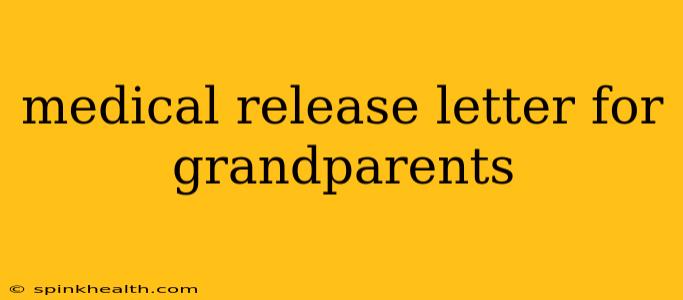Securing Peace of Mind: A Guide to Medical Release Letters for Grandparents
The bond between grandparents and grandchildren is precious. When health concerns arise for our beloved elders, navigating the complexities of medical information and care can feel overwhelming. This guide explores the crucial role of a medical release letter, providing clarity and empowering you to support your grandparents effectively. We’ll delve into what these letters entail, when they're needed, and how to approach the process with sensitivity and respect.
Imagine this: Your grandmother, a vibrant woman who loves to bake, has recently fallen ill. You're eager to understand her condition and assist in her care, but accessing her medical records requires her explicit permission. This is where a medical release letter becomes indispensable.
What is a Medical Release Letter?
A medical release letter is a formal document that grants a designated individual (or individuals) permission to access a patient's medical records and information. This permission is crucial for various reasons:
- Facilitating Family Care: It allows family members to be actively involved in understanding the diagnosis, treatment plans, and progress of their loved one's health journey.
- Coordinating Care: Multiple family members can coordinate care more effectively when they share pertinent information about medications, allergies, and ongoing health issues.
- Ensuring Continuity of Care: If your grandparents are transitioning between care facilities or medical providers, access to their records prevents gaps in care.
When Do Grandparents Need to Sign a Medical Release Letter?
Several situations might require a medical release letter from your grandparents:
- Seeking Secondary Opinions: When obtaining a second opinion from another specialist, having access to existing medical records accelerates the process and ensures the new doctor has a complete picture of the health history.
- Accessing Records for Insurance Claims: If medical bills require review or there’s a dispute with an insurance provider, your grandparents may need to sign a release.
- Sharing Information with Family Members: As mentioned earlier, this allows for shared understanding and coordinated care.
- Transferring Care to a New Provider: If your grandparents move to a new facility or switch doctors, a release ensures a seamless transfer of medical information.
What Information Should a Medical Release Letter Include?
A well-drafted medical release letter should be clear, concise, and unambiguous, generally including:
- Patient Information: Full legal name, date of birth, address, and contact information.
- Authorized Individual(s): Your full name, address, and relationship to the patient.
- Specific Information to be Released: State explicitly what information is requested (e.g., all medical records, specific test results, etc.). Being specific helps maintain privacy.
- Time Frame: Specify the period for which the access is granted (e.g., "for the duration of treatment," or a specific date range).
- Patient Signature & Date: The patient's signature confirms their consent.
- Witness Signature & Date (Optional): Often a good practice to have a witness sign, confirming the patient's signature's authenticity and consent.
- Healthcare Provider Information: The name and contact information of the healthcare provider holding the records.
How to Approach the Conversation with Your Grandparents
When requesting your grandparents to sign a medical release form, approach the conversation with empathy and patience. Explain clearly why you need access to the information and reassure them you are only seeking to support their well-being. Their comfort and understanding are paramount.
Who Can Sign the Release Form?
This is a crucial question. Your grandparents must be deemed competent to sign the form. If they lack the mental capacity to understand the implications of the release, a legal guardian or conservator will need to sign on their behalf. This necessitates legal counsel to ensure the process is correctly handled.
What if my grandparents refuse to sign the medical release?
This situation demands sensitivity and respect. You might consider discussing their concerns, clarifying any misconceptions, and finding alternative ways to assist in their care. Exploring options with their physician might be beneficial, providing an opportunity for a professional explanation of why access to certain information is crucial for their care.
Obtaining a Medical Release Letter: A Step-by-Step Process
- Obtain the Release Form: Your grandparents' doctor's office or the healthcare facility will typically provide the necessary form.
- Review the Form Carefully: Ensure all information is accurate and complete before your grandparents sign.
- Discuss with Your Grandparents: Explain the purpose of the letter and answer any questions they have.
- Witness the Signature (Optional but Recommended): Have a witness present to observe the signing process.
- Submit the Form: Return the completed form to the appropriate healthcare provider.
Navigating healthcare for loved ones requires careful planning and compassion. The medical release letter serves as a vital tool, empowering family members to participate actively in their grandparents' care while respecting their privacy and autonomy. Remember, open communication and a patient approach are essential in this sensitive process.

